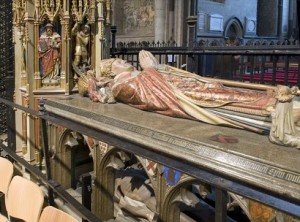The time had come when England was to claim for herself the fullness of power, ecclesiastical as well as temporal, within her bounds; and, in the concentration of all authority within the hands of the sovereign.
Henry VIII Makes Himself Head of the Church of England, featuring a series of excerpts selected from A Short History of the English People by John R. Green published in 1874. For works benefiting from the latest research see the “More information” section at the bottom of these pages.
Previously in Henry VIII Makes Himself Head of the Church of England.
Time: 1534
Place: London

What the nature of his policy was to be, had already been detected by eyes as keen as his own. More had seen in Wolsey’s fall an opening for the realization of those schemes of religious and even of political reform on which the scholars of the New Learning had long been brooding. The substitution of the lords of the council for the autocratic rule of the cardinal-minister, the break-up of the great mass of powers which had been gathered into a single hand, the summons of a parliament, the ecclesiastical reforms which it at once sanctioned, were measures which promised a more legal and constitutional system of government. The question of the divorce presented to More no serious difficulty. Untenable as Henry’s claim seemed to the new Chancellor, his faith in the omnipotence of parliament would have enabled him to submit to any statute which named a new spouse as queen and her children as heirs to the crown. But as Cromwell’s policy unfolded itself he saw that more than this was impending.
The Catholic instinct of his mind, the dread of a rent Christendom and of the wars and bigotry that must come of its rending, united with More’s theological convictions to resist any spiritual severance of England from the papacy. His love for freedom, his revolt against the growing autocracy of the Crown, the very height and grandeur of his own spiritual convictions, all bent him to withstand a system which would concentrate in the king the whole power of church as of state, would leave him without the one check that remained on his despotism, and make him arbiter of the religious faith of his subjects. The later revolt of the Puritans against the king-worship which Cromwell established proved the justice of the provision which forced More in the spring of 1532 to resign the post of chancellor.
But the revolution from which he shrank was an inevitable one. Till now every Englishman had practically owned a double life and a double allegiance. As citizen of a temporal state his life was bounded by English shores, and his loyalty due exclusively to his English King. But as citizen of the state spiritual, he belonged not to England, but to Christendom. The law which governed him was not a national law, but a law that embraced every European nation, and the ordinary course of judicial appeals in ecclesiastical cases proved to him that the sovereignty in all matters of conscience or religion lay, not at Westminster, but at Rome.
Such a distinction could scarcely fail to bring embarrassment with it as the sense of national life and national pride waxed stronger; and from the reign of the Edwards the problem of reconciling the spiritual and temporal relations of the realm grew daily more difficult. Parliament had hardly risen into life when it became the organ of the national jealousy, whether of any papal jurisdiction without the realm or of the separate life and separate jurisdiction of the clergy within it. The movement was long arrested by religious reaction and civil war. But the fresh sense of national greatness which sprang from the policy of Henry VIII, the fresh sense of national unity as the monarchy gathered all power into its single hand, would have itself revived the contest even without the spur of the divorce.
What the question of the divorce really did was to stimulate the movement by bringing into clearer view the wreck of the great Christian commonwealth of which England had till now formed a part, and the impossibility of any real exercise of a spiritual sovereignty over it by the weakened papacy, as well as by outraging the national pride through the summons of the King to a foreign bar and the submission of English interests to the will of a foreign emperor.
With such a spur as this the movement, which More dreaded, moved forward as quickly as Cromwell desired. The time had come when England was to claim for herself the fullness of power, ecclesiastical as well as temporal, within her bounds; and, in the concentration of all authority within the hands of the sovereign which was the political characteristic of the time, to claim this power for the nation was to claim it for the king. The import of that headship of the Church which Henry had assumed in the preceding year was brought fully out in one of the propositions laid before the convocation of 1532.
| <—Previous | Master List | Next—> |
Leave a Reply
You must be logged in to post a comment.